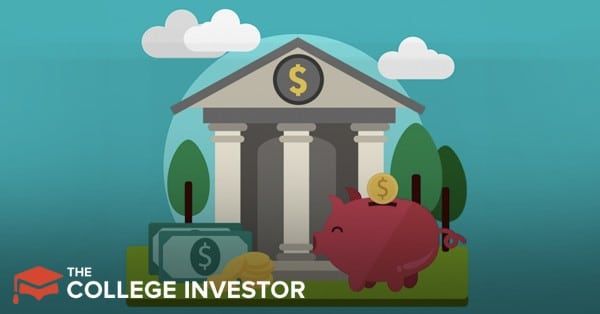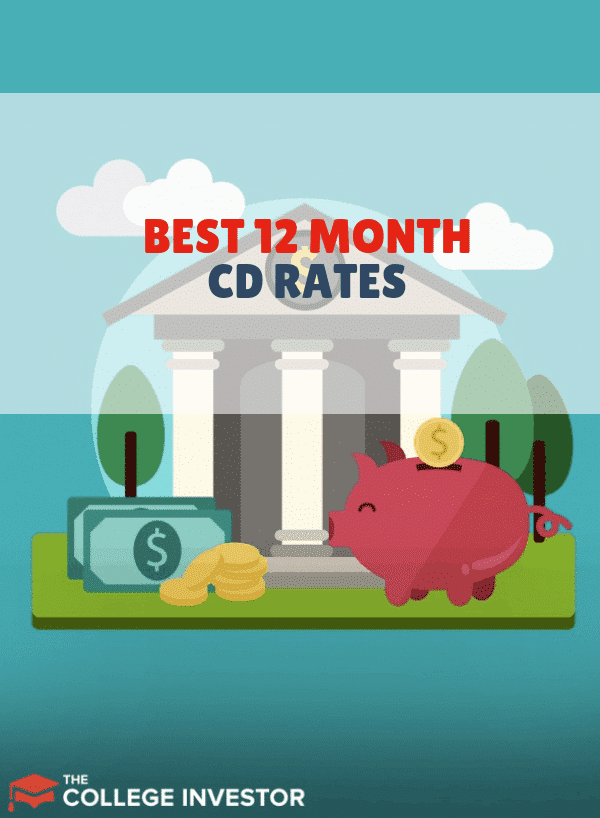
Are you searching for the best 12-month CD rates? Maybe you want to lock in your money for just a little bit in order to get a better rate? With one year CDs, you can get higher rates than a normal savings account, but the lock-up period is still short enough to work for most emergency funds.
To gain traction with savings, you need a system and some tools to help your money grow faster.
A 12-month (one year) CD from an online bank can help provide both. We break down our top picks of the best 12-month CD rates below!
Our Top Picks for the Best 12-Month CD Rates Right Now
We've taken the time to review your best options for CDs, bringing you the top options for 12-month CDs.
Daily rates change, but the banks below consistently offer solid rates and good features.
Note: The savings offers that appear on this site are from companies from which The College Investor receives compensation. This compensation may impact how and where products appear on this site (including, for example, the order in which they appear). The College Investor does not include all savings companies or all savings offers available in the marketplace.
NexBank - 5.15% APY
NexBank is the largest privately-held bank in Texas and it dates all the back to 1922.
Right now you can get 5.15% APY on a 12-month CD option in partnership with Raisin! There's only a $1 minimum to open an account!
Alliant Credit Union - 5.05% APY
Alliant Credit Union offers short term and long term CDs with competitive APYs.
Right now you can get 5.05% APY on a 12-month CD option!
Their CD have a $1,000 minimum deposit requirement, no maximium deposit, no monthly fees, and easy funds transfers!
Live Oak Bank - 5.00% APY
Live Oak Bank offers short term and long term CDs with competitive APYs.
Right now you can get 5.00% APY on a 12-month CD option! It does require a $2,500 minimum to open.
Plus, their CD has no monthly fees, and easy funds transfers!
Read our full Live Oak Bank review here.
First Financial Northwest Bank - 4.90% APY
First Financial Northwest Bank is a Washington-state based bank hat has partnered with Raisin to offer solid CD rates nationwide. This bank has been around for over 100 years, and has a solid track record of banking offerings.
Right now you can get 4.90% APY on a 12-month CD option! There's only a $1 minimum to open an account!
American First Credit Union - 4.90% APY
American First Credit Union is a credit union that has partnered with Raisin to offer solid CD rates nationwide.
Right now you can get 4.90% APY on a 12-month CD option! There's only a $1 minimum to open an account!
Barclays Bank - 4.85% APY
Barclays Bank offers short term and long term CDs with competitive APYs.
Right now you can get 4.85% APY on a 12-month CD option!
Plus, their CD has no minimum balance requirements, no monthly fees, and easy funds transfers!
Read our full Barclays review here.
Rising Bank - 4.80% APY
Rising Bank is the online bank of Midwest BankCentre. It focuses on delivering competitive high-interest savings accounts and CDs.
Right now you can get 4.80% APY on a 12-month CD option! There's a $1,000 minimum to open an account, and interest is credited toward the CD every three months.
Read our full Rising Bank review here.
Crescent Bank - 4.80% APY
Crescent Bank is a New Orleans based bank that offers both local and nationwide banking options. They currently offer some of the most competitive online certificates of deposit available. And they regularly run CD promos with exciting rates.
Right now you can get 4.80% APY on a 12-month CD option! There is a $1,000 minimum to open a CD.
Read our full Crescent Bank review here.
Western Alliance Bank - 4.75% APY
Western Alliance Bank is one of the largest commercial banks in the United States, and they are now offering an amazing 12 month certificate of deposit. In partnership with Raisin, you can open a 12-month CD account at Western Alliance Bank online.
Right now you can get 4.75% APY on a 12-month CD option!
SkyOne Credit Union - 4.75% APY
SkyOne Credit Union is a credit union that has partnered with Raisin to offer solid CD rates nationwide. They recently re-launched their 12 month CD at a very competitive rate. Plus, it's a no penalty CD!
Right now you can get 4.75% APY on a 12-month CD option! There's only a $1 minimum to open an account!
Discover® Bank - 4.70% APY
Discover Bank offers a short term and long term CDs with competitive APYs.
Discover® CDs have a $2,500 minimum to open and an early withdrawal penalty of 3 months interest.
Right now, you can earn 4.70% APY on a 12-month CD at Discover. That's better than most savings account options out there!
Read our full Discover Bank review.
Quontic - 4.50% APY
Quontic Bank is a leader in online banking and one of the few Community Development Financial Institutions that work directly with the public.
Quontic has great rates on savings accounts, a competitive high-yield checking account, and they offer a full ranges of high-yield CDs.
Right now you can get 4.50% APY on a 12-month CD option!
Read our full Quontic Bank review here.
Other 12 Month CD Options
What Is a 12-Month CD?
A CD, which is short for certificate of deposit, can pay higher savings rates than a regular savings account.
In exchange for the higher interest rate, you agree to leave your money alone for a specific period of time.
A 12-month CD, of course, then ties up your money for a full year.
During those 12 months, your money can grow at a higher rate compared to a high-yield or money market savings account.
You can buy CDs that mature in as little as three months. You can also buy 5-year CDs.
For many young investors, a 12-month CD offers a nice in-between: It’s long enough to generate decent interest but not so long you’re tying up money indefinitely.
12-Month CDs and Momentum
The higher interest yield on your savings makes a 12-month CD attractive, but it has other benefits, too.
Since you typically have to pay a fee negating some of your earned interest when you withdraw from a CD before it matures, a 12-month CD offers a nice incentive to leave your money alone.
Yes, life is unpredictable. Sometimes emergencies happen and you have to withdraw early from your CD. In a true emergency, you probably wouldn’t be too worried about losing the interest.
Under normal circumstances, though, placing an extra speed bump between you and your savings helps you leave it where it is.
You can’t just open your banking app and make a quick, free transfer as you could with a regular savings account.
Leaving your money alone keeps you from spending it, allowing your money grow.
For example, a $2,000 CD at 2.75 percent would have a $2,055 balance at the end of 12 months. No, earning $55 in interest a year won’t finance your retirement.
But savings is all about momentum:
- Leave the money alone for another year, and it could become $2,111.
- In five years, you’d have $2,290.
- After 10 years your $2,000 would be $2,623.
Still not impressed? Let’s introduce the third dimension: If you could buy a new $2,000 CD every year, you’d be adding exponentially to your potential for savings growth. You could get to a point at which the interest alone coming off your CDs could fund new CDs.
Talk about momentum!
The Moving Parts of a 12-Month CD
A CD combines three key elements:
- Your principal: This is the amount you’re saving. A $2,000 CD has $2,000 in principal. Be sure to choose a principal amount you can afford to live without for the duration of the CD’s term.
- Your time commitment: You can find a wide variety of CD term lengths. Most common time periods are 3-month, 6-month, 12-month, 18-month, 24-month, 36-month, 48-month, and 60-month. You won’t be able to withdraw your money without penalty during the term.
- Your interest rate: You’ll usually find much higher interest rates at online banks compared to your neighborhood branch of a big national bank. Higher rates, of course, equal more growth in savings.
A CD has other key features you’ll want to know about:
- Minimum deposits: Many banks and credit unions require a minimum deposit for your CD to earn the advertised interest rate; others allow you to invest any amount.
- Yield: This is the amount in interest your deposit will earn.
- Date of maturity: A new CD has a maturity date. Before the CD matures, you typically can’t withdraw funds without penalty.
- Penalties: The fees you’d pay for early withdrawal can vary from bank to bank. Most banks will charge you at least part of the interest the CD had already earned.
- Automatic reinvestment: When they reach maturity, many CD balances will roll over into a new, identical CD unless you direct your bank otherwise. The bank should notify you about the upcoming maturity date in time to let you decide.
When You Should Get a 12-Month CD
Before buying a CD of any term, make sure you can do without the money you’re investing throughout the term.
None of us can predict the future. Unexpected expenses will arise. Some may require you to withdraw your funds early.
But you can take some precautions by controlling the controllable before you buy a 12-month CD:
- Have an emergency fund: If you don’t have a few months worth of living expenses available in a savings account, take care of that before buying a CD.
- Make sure bills are up to date: If you’re on the verge of defaulting on a student loan, or if you’re a month or two behind on a credit card, deal with those issues first. You could spend more in interest and late fees than you’ll earn with your CD.
- Consider potential expenses: When your odometer reads 125,000 miles and your mechanic has been recommending a new timing belt since you passed 90,000 miles, consider tackling that expensive repair, or at least setting aside the money, before investing in a CD.
Keep an Eye on Interest Trends
One of the key advantages of a CD is its locked-in interest rate.
No matter what the Fed decides at its next meeting, your traditional CD’s interest rate will remain fixed throughout its term.
This can work to your advantage when interest rates are on the decline. As rates fall over the next year, you’ll continue earning at today’s rates throughout the term of your CD.
On the other hand, a rising interest rate can cost you a higher yield.
In six months, your locked-in CD rate may be lower than a new CD’s rate. You may want to wait a few months before buying in or to consider a more complex CD, which we’ll go into below.
A 12-month CD is short enough to insulate you from the long-term effects of rate fluctuations.
Still, it’s something to think about as you shop and compare rates.
Right now, the average 12-month CD is yielding 1.86% APY, according to the Federal Reserve. All of the 12-Month Term CDs on our list are much higher.
More Complicated CDs
So far we’ve kept it simple:
- term lengths,
- interest rates, and
- principal investments
If this post were a course, it might be called CDs 101.
Naturally, you can do a lot more with CDs to add flexibility, growth potential, and insulation against a changing market for interest rates. And traditional banks might have more options than online banks.
But, what else is out there?
Liquid CDs
With a liquid CD you can avoid the withdrawal penalty if you cash out early, either because you need to access the principal or you found a better rate elsewhere.
These CDs won’t yield as much interest as a traditional CD, but they can help you save if you expect rates to rise significantly during the CD’s term.
Bump-Up CDs
If you buy a long-term CD and rates start to increase, a bump-up CD lets you adapt your CD to the new climate without having to start over. You can exercise your bump-up option to increase your rate.
These CDs tend to yield less interest, but they can also help you avoid missing out on rate increases down the road.
Step-Up CDs
A step-up CD’s rates increase periodically without you having to exercise an option. While this sounds like a great idea, especially with a longer-term CD, each new rate applies only to the time period between increases and not to the entire term.
Step-up CDs can start with low interest rates and end with higher rates, but the overall yield is typically comparable to a traditional CD’s.
Brokered CDs
A bank or credit union sells its own CDs, and you’ll need to open an account to start saving.
Serious savers who want a wider variety of CDs to choose from may need a broker’s help. Otherwise they may need to manage a dozen separate accounts.
If you ever go this route, make sure your broker checks whether the CD is FDIC-insured before you buy in.
CD Laddering
A common technique known as CD laddering can add more flexibility to your portfolio.
If you had, say, $10,000, you could buy five separate $2,000 CDs. Each separate CD would have a different maturity date, ranging from 1 to 5 years.
By setting up this kind of a ladder, you’d have a CD reaching maturity each year, so each year you’d have the option of cashing out or reinvesting a fifth of your savings to keep the momentum going.
CDs in IRAs
Anyone legally old enough to work can open an Individual Retirement Account, or IRA, which can shelter some of your earnings from income taxes while preparing for retirement. CDs in IRAs combine the earning power of CDs with the tax savings of an IRA.
How to Shop for CDs
Next time you’re in your neighborhood bank branch, take a look at the promotional signs they have on the teller’s desk or hanging from the ceiling. There’s a good chance you’ll see the bank’s CD rates on display.
If it’s a credit union, they may call CDs “shared deposits.”
Make a mental note of the rates, but don’t ask the teller about buying a CD yet. The vast majority of the time you can find much higher yields at an online bank.
Because they don’t have to operate a nationwide network of branches and hire thousands of employees, online banks can usually give you higher rates of return on savings accounts as well as 12-month and other kinds of CDs.
Most online banks let you connect online to your traditional bank for online transfers.
If you’re happy with your current bank you can keep your checking account where it is and still open an online account for CDs.
FDIC Security Is a Must
No matter where you shop, make sure your deposit is protected by the Federal Deposit Insurance Company, or FDIC.
FDIC guarantees up to $250,000 in your deposits no matter what happens to the bank.
If you see a 12-month CD rate that’s significantly higher than all its competitors, you may want to double check about the issuing bank’s FDIC status. Banks offering the highest yields are less likely to be insured.
Look for Specials
Typically, a longer-term CD can yield a higher rate.
However, banks routinely offer special rates for shorter-term CDs. However, sometimes these specials have limits - such as $10,000 maximum.
Why would they do that? CDs benefit banks as well as depositors. Your willingness to leave your money alone gives the bank more stability.
If the bank foresees a need for stable deposits over the next two years, it may offer a higher rate on 24-month CDs to provide an incentive to customers.
Shop Around
Yes, interest rates and terms matter a lot. But you should also consider a bank’s other features before buying in.
- What is the minimum deposit? If you can’t afford it, keep shopping.
- What about transfers? Can you link the bank to your existing account? If not, consider how much you need that feature before buying.
- What about ATM access? Not all online banks have ATMs or even offer ATM access through other banks. Lack of ATM access can actually help you save, but only if you know you won’t need the money in a hurry.
- Customer service? If you needed to reach someone at your online bank, could you do so? TrustPilot or even Facebook reviews can tell you a lot about others’ experiences. The Better Business Bureau may have more refined insight.
Bottom Line: A 1 Year CDs Offer Balance
When you’re serious about saving and letting your money work for you -- rather than you working for it -- a 12-month CD gives you a great place to start. However, you also might want to simply consider a high yield savings account.
There’s essentially nothing to lose except the early withdrawal penalty if you had to access your money in a pinch.
A 12-month term is long enough to yield measurable growth yet short enough to give you an annual opportunity to access your money without penalty if needed.
Try to stick with it, though. Once you’re off and running, your 12-month CD can be the first step to a lifelong flow of savings growth.
Methodology
The College Investor is dedicated to helping you make informed decisions around complex financial topics like finding the best 12-month CDs. We do this by providing unbiased reviews of the top banks and CDs for our readers, and then we aggregate those choices into this list.
We have picked certificates of deposit based on our opinions of how easy they are to use, their costs and fees, any interest rates and bonuses provided, and a variety of other factors. We believe that our list accurately reflects the best 12 month CDs in the marketplace for consumers.

Robert Farrington is America’s Millennial Money Expert® and America’s Student Loan Debt Expert™, and the founder of The College Investor, a personal finance site dedicated to helping millennials escape student loan debt to start investing and building wealth for the future. You can learn more about him on the About Page or on his personal site RobertFarrington.com.
He regularly writes about investing, student loan debt, and general personal finance topics geared toward anyone wanting to earn more, get out of debt, and start building wealth for the future.
He has been quoted in major publications, including the New York Times, Wall Street Journal, Washington Post, ABC, NBC, Today, and more. He is also a regular contributor to Forbes.
Editor: Colin Graves Reviewed by: Richelle Hawley












